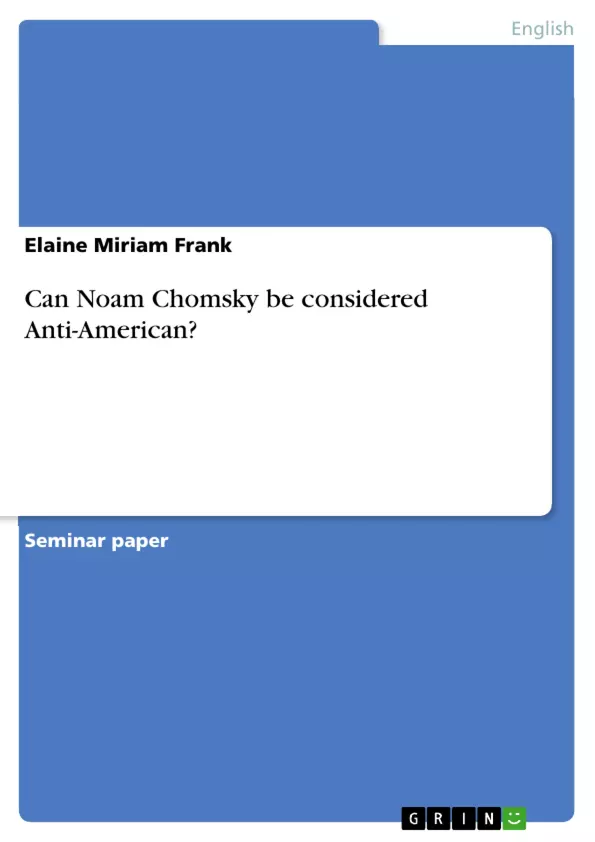Noam Chomsky is not only considered “the father of modern linguistics” and recipient of “world's top public intellectual" award in 2005, he is also a radical “political activist”.
His radical left-wing and partially anarchist’s views on current as well as past political/foreign affairs do not make him very popular in parts of American society.
Even other American critics like Emmnuel Todd refer to him as anti-American.
His views on Vietnam War, South American affairs and opinion of mass media have imparted him the title “Anti-American”.
The central question this paper deals with is: Whether Noam Chomsky is anti-American or just a political activist attempting to make the American people become aware of unnecessary political actions their government takes?
Inhaltsverzeichnis (Table of Contents)
- Introduction
- Definition Anti-Americanism
- Radicalization
- Views
- Views on Mass Media
- Views on Vietnam
- Views on Cuba
- Analysis of Radical Statements
- Radical Statements on Mass Media
- Radical Statements on Foreign Politics
- Conclusion
Zielsetzung und Themenschwerpunkte (Objectives and Key Themes)
This paper aims to explore the question of whether Noam Chomsky can be considered anti-American, examining his radical views and the influences that shaped them. It will delve into the complexities of defining "anti-Americanism," analyze the sources of Chomsky's radicalization, and assess his perspectives on various topics like mass media, Vietnam, and Cuba.
- Definition and characteristics of anti-Americanism
- Influences on Chomsky's political radicalization
- Chomsky's views on mass media, Vietnam, and Cuba
- Analysis of Chomsky's radical statements
- Determining whether Chomsky is anti-American
Zusammenfassung der Kapitel (Chapter Summaries)
- Introduction: Introduces the central question of whether Noam Chomsky can be classified as anti-American. It highlights Chomsky's status as a prominent intellectual and political activist, emphasizing the controversy surrounding his views. The paper outlines its approach to examining this question, including defining anti-Americanism, exploring Chomsky's radicalization, and analyzing his views on various issues.
- Definition Anti-Americanism: Examines the complex and multifaceted nature of the term "anti-Americanism." The chapter analyzes different perspectives on the definition, highlighting various interpretations of its meaning and application. It aims to establish a working definition of anti-Americanism that will guide the subsequent analysis of Chomsky's views.
- Radicalization: Investigates the factors that contributed to Chomsky's political radicalization. It explores the influences of his upbringing, including the Great Depression and his family's anarchist leanings. The chapter also examines the impact of Chomsky's personal experiences, particularly his witnessing of injustice and discrimination during his youth. It highlights Chomsky's view of his responsibility as an intellectual to expose and critique political injustices.
Schlüsselwörter (Keywords)
This paper focuses on the controversial figure of Noam Chomsky, exploring his radical views, political activism, and the complexities of defining anti-Americanism. Key themes include radicalization, political activism, intellectual responsibility, mass media criticism, foreign policy analysis, and the impact of Chomsky's views on American society.
Frequently Asked Questions
Why is Noam Chomsky often called "Anti-American"?
Chomsky's radical left-wing views on US foreign policy, the Vietnam War, and mass media have led critics to label him as anti-American.
What are Chomsky's views on mass media?
Chomsky argues that mass media often serves as a tool for government propaganda rather than providing objective information.
How did Chomsky's upbringing influence his radicalization?
His family's anarchist leanings and his experiences during the Great Depression shaped his critical view of political and social injustices.
Does Chomsky consider himself an anti-American?
The paper explores whether he is truly anti-American or a political activist trying to make citizens aware of their government's actions.
What award did Chomsky receive in 2005?
He was named the "world's top public intellectual" in 2005.
- Quote paper
- Elaine Miriam Frank (Author), 2015, Can Noam Chomsky be considered Anti-American?, Munich, GRIN Verlag, https://www.grin.com/document/294739



